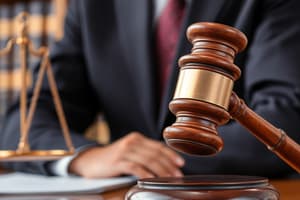Podcast
Questions and Answers
What does Rule 1.1 of legal representation require lawyers to do?
What does Rule 1.1 of legal representation require lawyers to do?
- Only represent clients in areas of the law they are already familiar with
- Charge clients extra fees for learning about new legal areas
- Ignore legal research and writing fundamentals learned in law school
- Educate themselves when taking on a representation in an unfamiliar area of law (correct)
Under Rule 1.2(a), what must a lawyer do regarding a client’s decisions?
Under Rule 1.2(a), what must a lawyer do regarding a client’s decisions?
- Not comply with client’s decision to settle
- Abide by client’s decisions concerning the objectives of representation (correct)
- Endorse the client’s political, economic, and social views
- Consult with the client on objectives and disregard their wishes
When can a lawyer limit the scope of their representation according to Rule 1.2(c)?
When can a lawyer limit the scope of their representation according to Rule 1.2(c)?
- If the lawyer is unfamiliar with the legal matter at hand
- If the client disagrees with the lawyer's strategy
- When the limitation is reasonable under the circumstances and the client consents (correct)
- Only when the lawyer is not willing to take on additional tasks
When can a lawyer withdraw representation under Rule 1.16?
When can a lawyer withdraw representation under Rule 1.16?
What is a lawyer prohibited from doing in terms of counseling a client according to the text?
What is a lawyer prohibited from doing in terms of counseling a client according to the text?
What factor is NOT relevant when considering competent representation according to Rule 1.1?
What factor is NOT relevant when considering competent representation according to Rule 1.1?
In which situation can a lawyer provide assistance in an emergency despite lacking the necessary skill?
In which situation can a lawyer provide assistance in an emergency despite lacking the necessary skill?
What was the outcome in Strickland v. Washington regarding counsel's performance?
What was the outcome in Strickland v. Washington regarding counsel's performance?
How should a lawyer handle a trial situation where more information is needed and there is a lead to pursue?
How should a lawyer handle a trial situation where more information is needed and there is a lead to pursue?
When can a lawyer provide adequate representation in a novel field according to the text?
When can a lawyer provide adequate representation in a novel field according to the text?
In an emergency situation where a lawyer lacks the necessary skill, according to the text, what action can the lawyer take?
In an emergency situation where a lawyer lacks the necessary skill, according to the text, what action can the lawyer take?
What should a lawyer do if they are dealing with a novel field according to the text?
What should a lawyer do if they are dealing with a novel field according to the text?
In what situation should a lawyer motion for a continuance according to the text?
In what situation should a lawyer motion for a continuance according to the text?
What is the standard set in Strickland v. Washington regarding counsel's performance?
What is the standard set in Strickland v. Washington regarding counsel's performance?
When considering competent representation under Rule 1.1, what factor is crucial regarding the lawyer's handling of legal matters?
When considering competent representation under Rule 1.1, what factor is crucial regarding the lawyer's handling of legal matters?
What is the lawyer's duty under Rule 1.1 when representing a client in an unfamiliar area of law?
What is the lawyer's duty under Rule 1.1 when representing a client in an unfamiliar area of law?
According to Rule 1.2(c), when can a lawyer limit the scope of their representation?
According to Rule 1.2(c), when can a lawyer limit the scope of their representation?
What action does Rule 1.2(d) prohibit lawyers from doing?
What action does Rule 1.2(d) prohibit lawyers from doing?
In what situation is a lawyer allowed to withdraw representation as per Rule 1.16?
In what situation is a lawyer allowed to withdraw representation as per Rule 1.16?
According to Rule 1.1, what exceptions allow a lawyer to provide advice in an area of law they are not familiar with?
According to Rule 1.1, what exceptions allow a lawyer to provide advice in an area of law they are not familiar with?
Flashcards are hidden until you start studying




